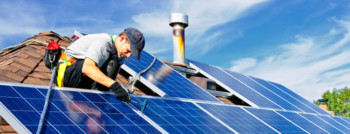Have you ever dreamed of living in a net-zero home? According to Peter Darlington, that dream may be closer than you think. In fact, you might already be living in your future net-zero home.
Darlington runs Solar Homes Inc., a Calgary company specializing in renovating existing homes to net-zero–a home that produces as much energy as it consumes. Net-zero might seem like a remote, ambitious target, but Darlington insists it’s more attainable than you might think. In fact, his first green reno project was on his own 1980-s era home.
“It’s really quite simple to do,” says Darlington. “You can just add some insulation some solar panels and you can have a home that doesn’t require fossil fuels anymore. It’s much more comfortable. Cost you less to operate. And it’s really a pretty good return on investment.”
4 steps to take your home to net-zero
To get your home closer to net zero, Peter outlines four key steps. And, he stresses that you don’t need to do it all at once.
1. Get an energy model done for your home
First, get an energy model done for your home to prioritize the stages of your project. This is critical because it tells you how much insulation you need, how much of a difference windows make, what size of heating system you require and what size of solar system is needed to power your home.
2. Add insulation, air sealing, siding and efficient windows
Then you will probably start with an exterior renovation, adding insulation and triple-paned windows, and then improving your overall air tightness. This will cost about $30,000 for the insulation, improving air tightness and siding and about $15-20,000 for windows.
3. Upgrade your mechanical systems
As your furnace and water heater wear out, replace them with electric heat pump models (furnace and water heater) and add a heat recovery ventilator to provide pre-warmed fresh air in your tightly sealed home. Mechanical upgrades will run about $15,000.
4. Add a solar system
Then add a solar array that is sized big enough to provide all of your electricity needs, which now includes your heating and hot water systems. If you require a larger solar system, about 10 kilowatts, it will run about $30,000.
“All these things can be done individually, so that you don’t have to bite off this massive capital cost right up front.”
“We put 10-kilowatt solar on the garage and that generates about 90 per cent of our annual requirements.”
And there’s never been a better time to think about going net-zero: “In Alberta there’s a bunch of incentives available from province towards insulation windows solar panels and there’s almost 15 grand available to a home that’s looking to renovate to net zero,” says Darlington. Currently there are rebates for insulation, windows and solar.
The Smart Home series was created by GreenEnergyFutures.ca for the Alberta Emerald Foundation with financial support from the Alberta Real Estate Foundation.
Source article by David Dodge and Scott Rollans

